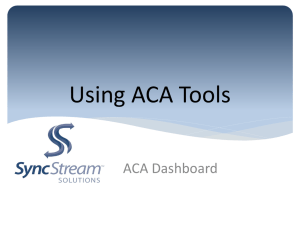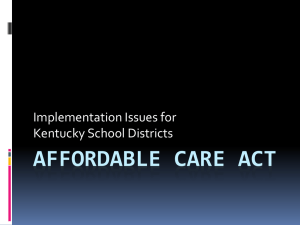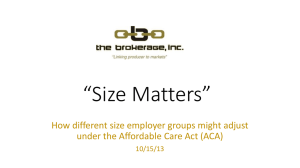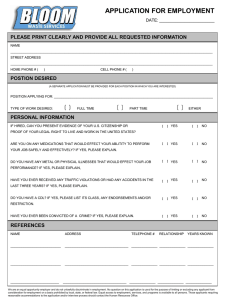CAJPA Presentation
advertisement
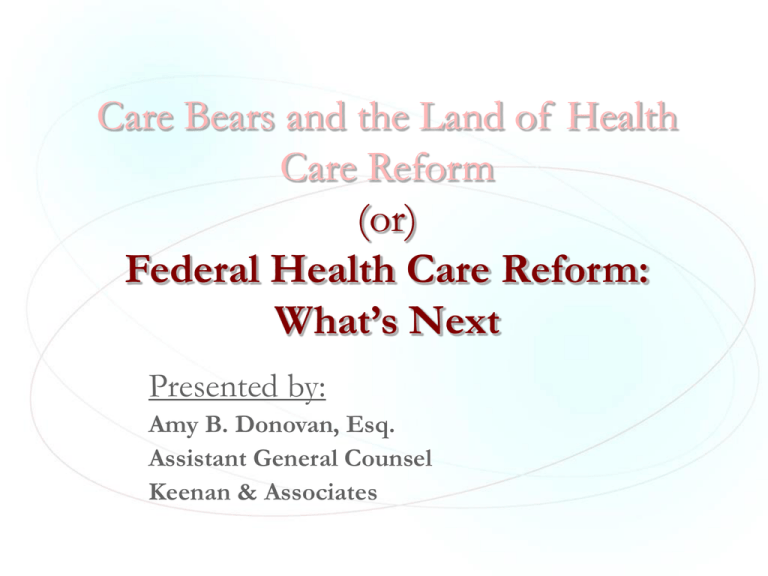
Care Bears and the Land of Health Care Reform (or) Federal Health Care Reform: What’s Next Presented by: Amy B. Donovan, Esq. Assistant General Counsel Keenan & Associates Care Bears Health Care Reform Introduction Six most important aspects of Health Care Reform: 1. Compliance 2. The new definition of “Full-Time Employee” 3. The California Health Benefit Exchange 4. The requirements for providing employees “affordable” health coverage of “minimum value” in 2014 and the Cadillac tax in 2018 5. Grandfathering 6. Wellness/VBIC/Preventive Services Mandate Agenda Supreme Court Decision Recap Compliance 2012 – 2014 2014 and Group Insurance California Legislation California Health Benefits Exchange Wrap-Up Supreme Court Decision Individual mandate constitutional under taxing power Medicaid expansion unconstitutional insofar as it would take away all Medicaid funds for failure to implement expansion Severance Compliance for 2012 – 2014 ACA Compliance 2012 $1.25 million overall aggregate annual dollar limit on Essential Health Benefits Claims and Appeals for Non-Grandfathered Plans Medical Loss Ratio Rebates Preventive Care Services for Women Summary of Benefits and Coverage (“SBC”) Plan Audits (Grandfathering) 2012– Annual Limits on EHB $1.25 million overall aggregate annual dollar limit on Essential Health Benefits • • Plan must be amended to state this limit effective first day of plan year in 2012 Interpretation of the meaning of “overall aggregate annual dollar limit” varies greatly 2012– Claims and Appeals Applies to Non-Grandfathered Plans New right for participants to request an independent external review Only for claims involving medical decision or rescission Plan Sponsors must have contracts with three Independent Review Organizations Fuller disclosures required in explanations of benefits (EOB), availability of non-English EOBs, language services and appeals rights 2012– Medical Loss Ratio Rebates Fully-insured plans must spend 85% of their premiums for claims, clinical services and quality improvement Notification by Issuer and payment, if any, by August 1, 2012 Non-ERISA Plans can be allocated according to contribution rate 2012– Preventive Care Details on preventive care services for women issued last year • • • Plan years on or after August 1, 2012 Well-woman visits, gestational diabetes screening, HPV testing, STD counseling, HIV counseling and screening, breastfeeding support, supplies and counseling, screening and counseling for interpersonal and domestic violence Controversy with Church Plans will be resolved in the courts 2012– Summary of Benefits and Coverage and Related Documents Summary of Benefits and Coverage • • • • • • Effective for open enrollments and plan years beginning on or after September 23, 2012 Applies to every group health plan (excluding excepted benefits such as dental and vision) Must be provided to eligible employees and family members Must be provided in a culturally and linguistically appropriate manner Electronic delivery permitted but paper copy must be made available free of charge Carve out plans have special challenges 2012– Summary of Benefits and Coverage and Related Documents Uniform Glossary • • • Same model document for everyone Found at DOL and HHS websites Employer may post on its intranet but inform employees by a paper copy available free of charge 60-Day notice of material change to SBC • Any change to a plan during the plan year that would cause a change to the SBC requires 60 days advance notice before change becomes effective 2012– Plan Audits for Grandfathering The Department of Labor has begun conducting audits of plans to check on compliance with the grandfather rules • • Auditing GF plans to ensure they are indeed grandfathered and have provided proper notice Auditing NGF plans to ensure they complied with NGF rules timely Have an audit file ready to go • • • Plan document as of March 23, 2010 and amendments Communications to employees about rates Proof of plan design changes ACA Compliance 2013 Definition of Essential Health Benefits $2 million overall aggregate annual dollar limit on Essential Health Benefits $2,500 contribution cap to Health Flexible Spending Arrangements (“Health FSA”) Report value of health coverage on IRS 2012 Form W-2 Notice of Exchange Clinical Effectiveness Research Fee for 2012 2013– Definition of Essential Health Benefits California AB 1453/SB 951 designate ACA requirements + Kaiser small group HMO 30 as of 1Q 2012 Self-insured plans and fully-insured large group health plans will not be required to offer Essential Health Benefits, but definition does apply to: • • Lifetime limits Annual limits Sponsors may continue to use good faith effort to define what is, and what is not, an Essential Health Benefit until guidance is issued 2013– Annual Dollar Limit Floor Rises $2 million overall aggregate annual dollar limit on Essential Health Benefits • • • • Effective for Plan Years beginning before January 1, 2014 Plan Amendment required Review your definition of Essential Health Benefit Consider converting dollar limits to visit limits 2013– Health FSA Cap $2,500 salary reduction cap to Health FSAs • • • Effective for plan years beginning on or after January 1, 2013 $2,500 limit applied on an employee-by-employee basis Plan amendment required but no later than December 31, 2014 retroactive to 2013 provided that the plan is operated in compliance for the 2013 Plan Year 2013– W-2 Reporting Report value of 2012 health coverage by January 31, 2013 • • Includes employer and employee portion of: ▫ Major medical and Rx; wellness, EAP and on-site medical clinics if COBRA; employer contribution to Health FSA ▫ Pre-tax payments for voluntary benefits, or if paid by employer (e.g. cancer insurance) Use unsubsidized COBRA rate to calculate value (minus administrative fee) Issues to address: • • • • • Reporting on employees who leave mid-year Off-month payroll cycle – final payroll Information obtained after the close of the plan year Non-calendar year plans Mid-month changes 2013– Notice of Exchange Plan Sponsor must deliver to employees no later than March 31, 2013 Anticipate a model form for 2013 Informs employees of availability of health coverage on the Exchange Advises of the potential for government subsidies and reduced cost-sharing Advises of penalties for failure to have Minimum Essential Coverage California AB 792– requires court and health plan notice of Exchange, but does not address employer notice requirement 2013– Clinical Effectiveness Research Supports federally mandated research on best practices for most effective treatments • • • • • $1.00/covered life for the 2012 Plan Year $2.00/covered life for each year thereafter to 2019 Sponsor liability for self-insured plans Insurance carrier liability for fully-insured plans Annual Tax Return and payment ▫ ▫ Payment due no later than July 31 TPA is prohibited from submitting on sponsor behalf ACA Compliance 2014 Plans must offer coverage for all children to age 26 regardless of their eligibility for other coverage No overall aggregate annual dollar limits on Essential Health Benefits No preexisting condition exclusions regardless of age Eligibility waiting periods limited to no more than 90 days Non-grandfathered plans must cover routine services for clinical trials Exchange Reinsurance Program Fee imposed on plans Employer reporting to Exchange 2014– Dependent Coverage to age 26 Plans must offer coverage for all children to age 26 regardless of their eligibility for other coverage • • • • • Covered under any parent plan Covered under their employer’s plan Covered under their spouse’s plan Coordination of Benefits challenges Mid-Year Enrollment Rights 2014– No Annual Dollar Limits No overall aggregate annual dollar limits on Essential Health Benefits • • • Revisit definition of Essential Health Benefits Take advantage of visit limits as compared to dollar limits No need to offer Essential Health Benefits No preexisting condition exclusions regardless of age • Certificate of Creditable Coverage 2014– Limits on Waiting Periods Eligibility waiting periods limited to no more than 90 days • • • • • If eligibility is based on time-served only 90-day period starts when all other requirements satisfied. For example, promotion to new classification Check collective bargaining agreements for probationary periods longer than 90 days Check collective bargaining agreement for work rules for full-time employees – may need to re-define FTE Part-Time employees may have a different rule 2014– Coverage for Clinical Trials Non-grandfathered plans must cover routine services for clinical trials • • Cannot prevent participation in a Clinical Trial if (1) recommended by participant’s physician; or (2) participant makes the case that he/she satisfies the eligibility requirements for the Clinical Trial Must cover all routine costs of Clinical Trial that are covered under group health plan (e.g. blood draw) 2014– Exchange Reinsurance Program Fee Exchange Reinsurance Program Fee imposed on plans • • • • • Paid by the carrier or TPA To U.S. Department of Health and Human Services Additional amounts may be required of the California Health Benefit Exchange Carrier/TPA reports to HHS Amount has not yet been determined 2014 and Group Insurance What Else Happens in 2014? Individual Mandate HBEX health plans become effective • • Exchange coverage issued on a guaranteed issue basis with no medical underwriting Premium subsidies and cost sharing reductions for lowpaid individuals who purchase Exchange coverage New definition of full-time employee Tax penalties for employers who for full-time employees: • • • Provide no coverage, Provide unaffordable coverage, or Provide coverage that provides less than minimum value New Definition of Full-time Employee Works, on average, 30 hours per week • • May use hourly equivalents for salaried individuals FTE under ACA is only for group health coverage ▫ Doesn’t affect other work rules or overtime • Month-by-month calculation ▫ ▫ Part-time employee in one month may be a fulltime employee in another month FTE Look-Back/Stability Safe-Harbor New Definition of Full-time Employee Why is this important? • • Employers are encouraged to provide affordable medical coverage of minimum value to FTEs Employer tax penalties are based on a number of FTEs ▫ ▫ • $2000 x number of FTEs (after the first 30) for failing to offer coverage $3000 x number of FTEs offered coverage who instead gets a premium credit to purchase on the Exchange Certain Lower-Paid FTEs are eligible for government subsidies (triggering employer tax penalties for employers with at least 50 FTEs) Employer Tax Penalties “Unaffordable” is based on the cost of the employer’s lowest cost single only coverage as a percentage of an employee’s household income • • More than 9.5% is “unaffordable” How is an employer to estimate an employee’s household income? 2014– Group Insurance Strategy Realign workforce using ACA definition of FTE Articulate a benefits philosophy (i.e. what are you trying to accomplish with your health benefits?) Begin preliminary workforce analysis using ACA definition of FTE Estimate potential tax exposure, if any Continual realignment of workforce benefits to benefits philosophy to FTE workforce Consider realignment of workforce benefits to benefits philosophy to PTE workforce 2014– Group Insurance Strategy Employer cost of medical coverage for the low-paid FTEs may be significantly greater than the tax penalty Employee cost of medical coverage on the Exchange may be significantly less than employer coverage when subsidies are available Decision: eliminate the possibility of government subsidies (and employer tax penalties); embrace them; ignore them; or something else? Depends upon your benefits philosophy, collective bargaining 2014– Group Insurance Strategy Evaluate impact of the Exchange • • • • • • Could it change employee behavior? Employment practices (e.g. cash-in-lieu) relative to the Exchange What behaviors do you want to promote/discourage? Does the Exchange present an opportunity? Would it impact retention of different types of employee? Would employees near Medicare retirement age leave the workforce? 2014– Collective Bargaining Definition of FTE and PTE in CBA/MOU Probationary periods/Waiting periods Coverage for Part-Time Employees Opportunities for subsidy-eligible employees Medicare retirees Early retirees California Legislation 2012 Legislation Impacting Group Health Plans AB 1083 AB 1761 Would have impacted stop-loss for self-funded small groups AB 340 Requires a formal agreement for producer to hold themselves out as selling coverage on the Exchange SB 1431 Rewrites CA small group rules to be consistent with ACA provisions Impact on retiree health plans 2013 special session California Health Benefits Exchange California Health Benefit Exchange CA first state in nation to have stand alone law RFPS being issued constantly Fully funded through 2015 – then must be self supporting through fees and revenue Likely to become largest state agency Rolling fast to open enrollment by August 2013 September HBEX Meeting Premium Aggregation Individual Exchange Agent Payment Looming decisions • • • SHOP Policies QHP and Benefit Design Policies Service Center Options October Meeting Health Plan Solicitation – Finally! Consumer Assistance/Ombudsman Outreach and Education Grant Program Criteria Exchange Blueprint • • • 1. SHOP Organizational Structure 2. Stakeholder Consultation Plan 3. Exchange Name and Branding Thank You . . . Keenan & Associates is an insurance brokerage and consulting firm. It is not a law firm or an accounting firm. We do not give legal advice or tax advice and neither this presentation, the answers provided during the Question and Answer period, nor the documents accompanying this presentation constitutes or should be construed as legal or tax advice. You are advised to follow up with your own legal counsel and/or tax advisor to discuss how this information affects you.
